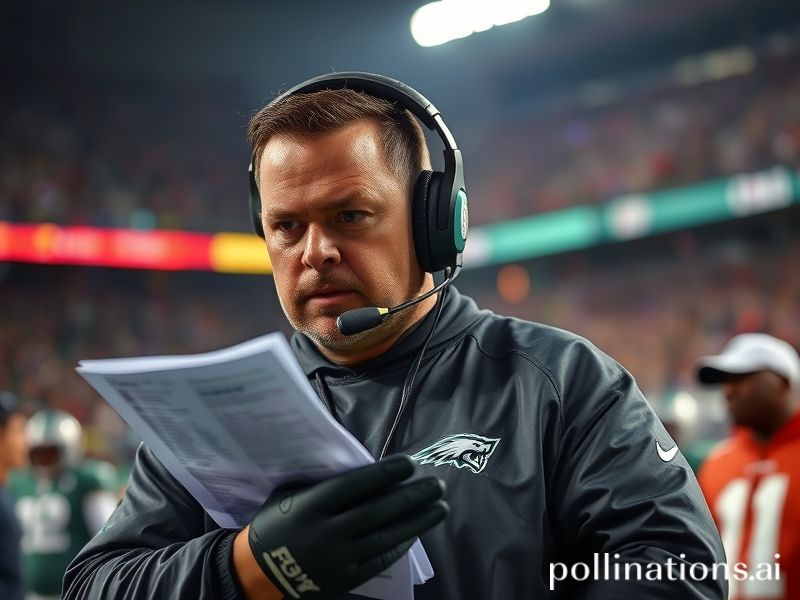Todd Bowles: The NFL’s Accidental UN Peacekeeper—A Global Parable of Competence Amid Chaos
Todd Bowles, the man whose résumé reads like a postcard from the international league of professional displacement, has become the NFL’s accidental diplomat. One moment he was a quiet defensive savant in Tampa Bay, the next he was yanked into the cockpit of the Buccaneers like a UN peacekeeper parachuted into a war zone he never asked to referee. The global spin cycle—24-hour news, social-media kangaroo courts, and the ever-present threat of Tom Brady’s retirement—made his promotion less a coaching decision and more a geopolitical event, complete with sanctions (fan outrage) and reparations (free-agency spending sprees).
Internationally, the elevation of Bowles is a tidy allegory for our times. Picture the United Nations Security Council, but everyone is wearing Under Armour. One superpower (Brady) abruptly vacates his permanent seat; smaller regional powers (Mike Evans, Shaq Barrett) scramble to hold the line; and a soft-spoken consensus-builder from Elizabeth, New Jersey, is handed the gavel without ever having asked for it. In Brussels they call this “institutional fatigue.” In the NFC South they call it Tuesday.
The appointment resonates far beyond Raymond James Stadium. Across Europe’s top football leagues—where coaches are fired faster than you can say “Brexit”—Bowles’ ascension is greeted with a collective Gallic shrug. Ligue 1 managers, weary of being sacked by text message at dawn, marvel at the quaint American custom of “promoting from within.” Meanwhile, in the J-League, where corporate sponsors rotate coaches the way salary-men rotate karaoke songs, Bowles’ calm stoicism is studied like an exotic koan: What is the sound of a man who refuses to throw tablets on the sideline?
Asia’s booming sports-gambling markets have already priced Bowles into the futures board. Macau traders, who can arbitrage the emotional volatility of a Manchester United fan forum faster than you can blink, list the Buccaneers at 22–1 to repeat as champions. Their reasoning: Bowles is a known quantity, allergic to melodrama, and therefore unlikely to detonate the locker room before Lunar New Year. Stability, in 2023, is its own dark comedy—like congratulating a cruise captain for not hitting the iceberg everybody saw coming.
Back in the Western Hemisphere, Brazil’s futebol cognoscenti watch with perverse fascination. They understand the art of defensive architecture—after all, they invented the phrase “jogo bonito” and then spent fifty years perfecting how to strangle it. Bowles’ Tampa-2 schemes are parsed on YouTube breakdowns narrated in rapid-fire Portuguese, each clip ending with the inevitable comparison to 1990s Corinthians bunker tactics. Somewhere in São Paulo, a data analyst in a Flamengo hoodie updates a spreadsheet labeled “Gringos Who Might Survive Rio.” Bowles’ name is penciled in, right next to “Keanu Reeves if he ever coaches.”
The broader significance, stripped of helmet logos and fantasy points, is that Todd Bowles has become a Rorschach test for a planet that no longer trusts its own institutions. Electorates vote for chaos, markets swing like mood rings, and yet here is a 58-year-old man who still says “Yes, sir” and “No, ma’am” while overseeing millionaires who could buy a small island nation. His very existence is a quiet rebuttal to the assumption that leadership must now be performative, narcissistic, and loud enough to trend. In that sense, Bowles is the final adult in a room full of Molotov cocktails—armed only with a laminated play sheet and the faint hope that grown men will, for once, do their jobs.
Conclusion? The world will keep spinning, the Twitter mobs will keep howling, and some Monday night in December the Buccaneers will probably lose on a last-second field goal. But somewhere between the hash marks, Todd Bowles will still be standing, arms folded, expression unreadable behind his mask. And for a brief, absurd moment, the international community—gamblers, fans, insomniac traders in Tokyo—will share the same wry thought: maybe competence isn’t dead; it’s just been hiding in plain sight, wearing a visor and waiting for the next snap.







